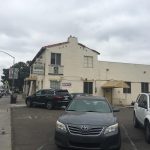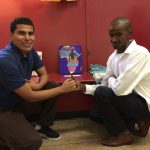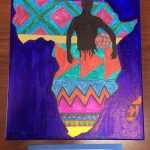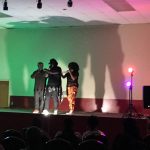Dear Students of the Race and Oral History Course (HIUS 144),
This quarter is going to be an amazing experience. The class will be different from any other at UCSD. It is not a traditional course. It will require movement, communication, and relationship building. While it may sound overwhelming to be part of this group, it will not be, since the experiences will be rewarding and transformative.
This course offered opportunities that go beyond the parameters of UCSD. In my experience, I had previously had the opportunity to meet and connect with the East African Cultural and Community Center at City Heights, which is the community that I worked with, this spring quarter of 2018. This previous involvement facilitated many initial obstacles because I knew where the community was located and the people that they served. I knew what to expect, but I was still able to learn much more about them. It was satisfying to take a course that puts community involvement at the heart of their instructions. As someone that is not from San Diego, being involved with a community outside La Jolla helped me to feel at home and not to distant from my community in Los Angeles (LA). The experience of this class was enriching because it gives us an alternative vision to what education should be and what direction it can take. This course should continue to be offered because it gives us a great insight into what it is to do oral history and all the details that come with this process. It is not a simple adventure. As mentioned earlier, this class provides us with the platform to reconnect with communities that are not within La Jolla.
In working with our community partner at City Heights, I was able to better understand the East African community in City Height, but in particular the Somalian community. During this experience, I learned more about their culture (e.g. food, religion) and their difficulties as they navigate this country. I learned about the importance of supporting the youth. Therefore, the community partner offers opportunities for the youth to congregate and play together at their game room in the community center. The center also creates workshops and tutoring to inform and support them with their education. I learned that education takes place in the community. It was important to learn of the difficulties in living a place that is different from your native country, and how this causes difficulties in the development of the next generation.
From my interview process, I learned that building a relationship is deeply influential in making the process smoother and less tense. People need to feel comfortable in order to speak about their powerful experiences. Another thing that I learned from my relationship with the narrator was that moving from one place to another is difficult when you are unfamiliar with the language, culture and systems. While moving places is tough, I learned that there are moments of happiness, such as playing football. There are things that transcend our borders (e.g. language) that is powerful enough to bring people together such as sports, music, dance or other things. The biggest challenge in completing the course was time and transportation. For those who may not have your personal mode of transportation you will need to rely on your friends, classmates, and/or public transportation. As many of you already know, the quarter system is challenging and grueling work, so it will be difficult to make time to be part of the community and build relationships. Fostering a healthy relationship with our partners requires time and commitment, which need more than a quarter. Another challenge for me this quarter was transportation, since I do not have a car; I had to rely on classmates and the public transportation system to move around from City Heights to La Jolla. In order to be more successful in this course, I would highly suggest making a quarterly plan to schedule in as many site visits as you can. Therefore, consider your time and transportation very critical to this course.
Peace,
Leonel Pérez





